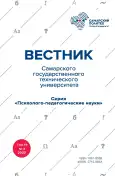Theory and practice of labor education of junior schoolchildren in extracourse activities
- Authors: Sarmutdinova G.B.1
-
Affiliations:
- Orenburg State Pedagogical University
- Issue: Vol 19, No 4 (2022)
- Pages: 5-16
- Section: Theory and methodology of education
- URL: https://journal-vniispk.ru/1991-8569/article/view/255347
- DOI: https://doi.org/10.17673/vsgtu-pps.2022.4.1
- ID: 255347
Cite item
Full Text
Abstract
The paper emphasizes the importance of junior schoolchild’s labor education in extracurricular activities, a negative trend of developing generation underestimation is noted. The optimal transformation of the junior schoolchild’s labor education of in extracurricular activities is determined. It is clarified that labor is the most important means of introducing schoolchild to universal, aesthetic and individual values. The results of theoretical analysis and practical experience, ways to eliminate the identified difficulties in the organization of labor education of junior schoolchild in extracurricular activities are presented. The functions and tasks of a teacher, a schoolchild and a parent that influence the labor education of a junior schoolchild in extracurricular activities are clarified. The paper highlights the functions of labor education: teaching, developing, educational. The main function of the teacher is the organization of interaction with junior schoolchildren and their parents, the integration of various types of activities (cognitive, gaming, labor), according to which cognitive processes develop (perception, thinking, memory, etc.), their ability to communicate and work together with the subjects. The solution of the problem: to study the theory of labor education and describe the experience of labor education of a junior schoolchild in extracurricular activities, required a phased solution of it, taking into account the moral standards of the junior schoolchild, certain rules of his behavior. At the first stage of experimental work, we recorded the acquired qualities of labor education of junior schoolchildren in situations of life activity that illustrate their attitude to society, the team, work, people, and themselves. And at the second stage, the features of the influence of labor activity on interpersonal communication were revealed, and on this basis the level of development of the team in labor activity was determined.
Full Text
##article.viewOnOriginalSite##About the authors
Galiya B. Sarmutdinova
Orenburg State Pedagogical University
Author for correspondence.
Email: galia_biriketovna@mail.ru
ORCID iD: 0000-0002-5586-8996
Scopus Author ID: 8614-0459
Assistant of Pedagogy and Sociology Department
Russian Federation, OrenburgReferences
- tass.ru [Internet]. V Gosdume schitayut pravil’noi ideyu o trudovom vospitanii v shkolakh. Informatsionnoe agentstvo TASS. Available at: https://tass.ru/obschestvo/4138720?utm_source=yandex.ru&utm_medium=organic&utm_campaign=yandex.ru&utm_referrer=yandex.ru (In Russ.)
- Allagulov AM, Abulkairova GB. Relevance of labor education of a younger schoolchild in the modern primary school. Modern Problems of Science and Education. 2020;(1):9. (In Russ.) doi: 10.17513/spno.29479
- Allagulov AM, Abulkairova GB. Osnovnye usloviya ehffektivnogo trudovogo vospitaniya mladshego shkol’nika. Proceeding of the IV All-Russian Methodological and Practical Conference: «Obrazovatel’nye tekhnologii v sovremennom uchebno-vospitatel’nom prostranstve»; Sept 2, 2021. Petrozavodsk: MTSNP «Novaya nauka», 2021. P. 6–11. (In Russ.)
- Aliomarov LM, Malakhmaeva SR. Trud kak vospitatel’nyi element sovremennogo obshchestva. Proceeding of the III International science conference: «Problemy i perspektivy razvitiya obrazovaniya»; Jan 2013; Perm. Perm: Merkurii, 2013. P. 68–69. (In Russ.)
- Grigor’ev DV, Stepanov PV. Vneurochnaya deyatel’nost’ shkol’nikov: metodicheskii konstruktor. Posobie dlya uchitelei. Moscow: Prosveshchenie, 2010. 94 p. (In Russ.)
- Gavrilychev GF. Sovremennyi shkol’nik, kakoi on? Elementary school. 2004;(3):13–16. (In Russ.)
- Mel’nichuk IA. Trudovoe i professional’noe vospitanie mladshikh shkol’nikov: posobie dlya pedagogov uchrezhdenii obshchego sred nego obrazovaniya s belorusskim i russkim yazykami obucheniya. Osipova MP, editor. Minsk: Natsional’nyi institut obrazovaniya, 2022. 168 p. (In Russ.)
- Oparina SA, Zhestkova EA. Development of cognitive interest of younger school students in after-hour activities. Elementary school. 2018;(12):37–41. (In Russ.)
- Ryndak VG. Pedagogika schast’ya: kak uchit’ i uchit’sya byt’ schastlivym: monografiya. Orenburg: Izdatel’stvo OGPU, 2020. 179 p. (In Russ.)
- Yusupkhadzhieva TV. Actual approaches to realization of work education in modern elementary school. Mir nauki, kultury, obrazovaniya. 2016;(3):59–61. (In Russ.)
- Yakovleva EV. Features of extracurricular activities for formation of culture of safe social behavior at schoolchildren. Modern Problems of Science and Education. 2018;(2):165–173. (In Russ.)
- Barker D. Interaction of teachers and parents as a successful pledge of development of children. New York, 2013. P. 43–84.
- Dewar G. Features of children’s of play. Sci J. 2016;(4):34–76.
- Dewar G. Upbringing of children of preschool age in the course of labor activity. Sci J. 2015;(1):1–13.
- Grochowalska M. Interactive learning environment for children in the beliefs of pre-school teachers. Ped J. 2016;(11):1–34.
- Wilson D. The concept of parental identity. Ped J. 2017;(1):12–42.
Supplementary files







